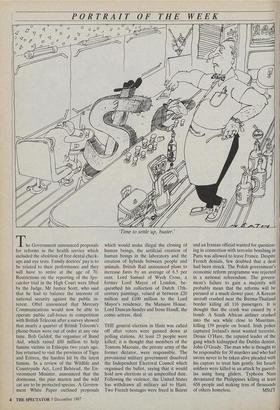PORTRAIT OF THE WEEK
`Time to settle up, buster.'
The Government announced proposals for reforms in the health service which included the abolition of free dental check- ups and eye tests. Family doctors' pay is to be related to their performance and they will have to retire at the age of 70. Restrictions on the reporting of the Spy- catcher trial in the High Court were lifted by the Judge, Mr Justice Scott, who said that he had to balance the interests of national security against the public in- terest. Oftel announced that Mercury Communications would now be able to operate public call-boxes in competition with British Telecom after a survey showed that nearly a quarter of British Telecom's phone-boxes were out of order at any one time. Bob Geldof, the organiser of Band Aid, which raised £80 million to help famine victims in Ethiopia two years ago, has returned to visit the provinces of Tigre and Eritrea, the hardest hit by the latest famine. In a review of the Wildlife and Countryside Act, Lord Belstead, the En- vironment Minister, announced that the dormouse, the pine marten and the wild cat are to be protected species. A Govern- ment White Paper outlined proposals
which would make illegal the cloning of human beings, the artificial creation of human beings in the laboratory and the creation of hybrids between people and animals. British Rail announced plans to increase fares by an average of 6.5 per cent. Lord Samuel of Wych Cross, a former Lord Mayor of London, be- queathed his collection of Dutch 17th- century paintings, valued at between £20 million and £100 million to the Lord Mayor's residence, the Mansion House. Lord Duncan-Sandys and Irene Handl, the comic actress, died.
THE general election in Haiti was called off after voters were gunned down at polling stations. At least 23 people were killed; it is thought that members of the Tontons Macoute, the private army of the former dictator, were responsible. The provisional military government dissolved the Independent Electoral Council which organised the ballot, saying that it would hold new elections at an unspecified date. Following the violence, the United States has withdrawn all military aid to Haiti. Two French hostages were freed in Beirut and an Iranian official wanted for question- ing in connection with terrorist bombing in Paris was allowed to leave France. Despite French denials, few doubted that a deal had been struck. The Polish government's economic reform programme was rejected in a national referendum. The govern- ment's failure to gain a majority will probably mean that the reforms will be pursued at a much slower pace. A Korean aircraft crashed near the Burma-Thailand border killing all 116 passengers. It is thought that the crash was caused by a bomb. A South African airliner crashed into the sea while close to Mauritius, killing 159 people on board. Irish police captured Ireland's most wanted terrorist, Dessie O'Hare, the reputed leader of the gang which kidnapped the Dublin dentist, John O'Grady. The man who is thought to be responsible for 30 murders and who had sworn never to be taken alive pleaded with his captors to treat him gently. Six Israeli soldiers were killed in an attack by guerril- las using hang gliders. Typhoon Nina devastated the Philippines killing at least 658 people and making tens of thousands










































































 Previous page
Previous page